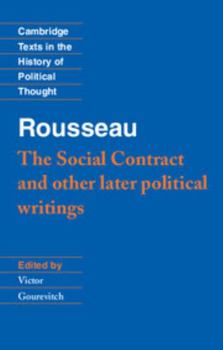Rousseau: 'the Social Contract' and Other Later Political Writings
Select Format
Select Condition 
Book Overview
A comprehensive and authoritative anthology of Rousseau's major later political writings in up-to-date English translations. This volume includes the essay on Political Economy, The Social Contract,... This description may be from another edition of this product.
Format:Paperback
Language:English
ISBN:0521424461
ISBN13:9780521424462
Release Date:August 1997
Publisher:Cambridge University Press
Length:400 Pages
Weight:1.10 lbs.
Dimensions:0.9" x 5.5" x 8.4"
Customer Reviews
1 rating
Man is born free, and everywhere he is in chains
Published by Thriftbooks.com User , 17 years ago
Jean Jacques Rousseau born (1712-1778), in Geneva mother dies in childbirth, he was an engravers apprentice. Stayed out too late one night and locked out of the city, knew he would get in trouble for it so he takes off for France, and meets Madame De Warrens becomes his lover and she converts him to Roman Catholicism. He had a lifelong mistress had 5 kids which he left with an orphanage, which is amazing considering he wrote the book "Emile," which was a guide to raising and educating young children. He neglected the opportunity to put theory into practice. To begin at the beginning, famous lines of book "The Social Contract," "Man is born free, and everywhere he is in chains." The question he asks, how do we find a way to get people to live together in groups? To live together in society and yet still make it true that each person only obeys himself that leaves us as free as when we were in the state of nature. He thinks he has the answer, he thinks he can legitimate, a kind of society, where people have this much freedom. There are certain things that he thinks are necessary for this, first, it has to be a society with general laws. It can't be that whoever is in charge of the government gets to do whatever they feel like doing. There has to of been laws made that authorize this. Second, there has to be universal consent to the laws, everybody has to accept the laws. Now this may be a little unclear, because there is a point that Rousseau talks about majority rule. It does make sense though there is a sense that he believes that the people have to consent to all of the laws, it has to be unanimous, it is just going to take a little while to get to that point. We will see how he reconciles these ideas. Third, there has to be unlimited Sovereignty, people have no rights against the laws you can't say the laws are illegitimate because they violate your rights the way that Locke would say for example people completely give up their rights to the collective. Therefore, there is no worry that a law might trespass on somebody's rights. For Rousseau, be sure to understand that this idea of sovereignty means the power to make laws. Therefore, it is a little bit different say than what you got out of Hobbes were he talks about the sovereign's power. For Hobbes, sovereign power is the power to say what goes. There is no real distinction between what we would call legislative power and executive power. You know the power to make the law and the power to enforce the laws. For Rousseau, sovereignty means the power to make the laws. Therefore, that's the power that is unlimited. Everything the state does has to be done in accordance to the laws. However, there is no limit on what the laws can be. At least no limits coming from the idea of violating individual rights. The only limit on the power of the state is the laws. There is this kind of notion that periodically there would be an assembly of people to come together to decide on




